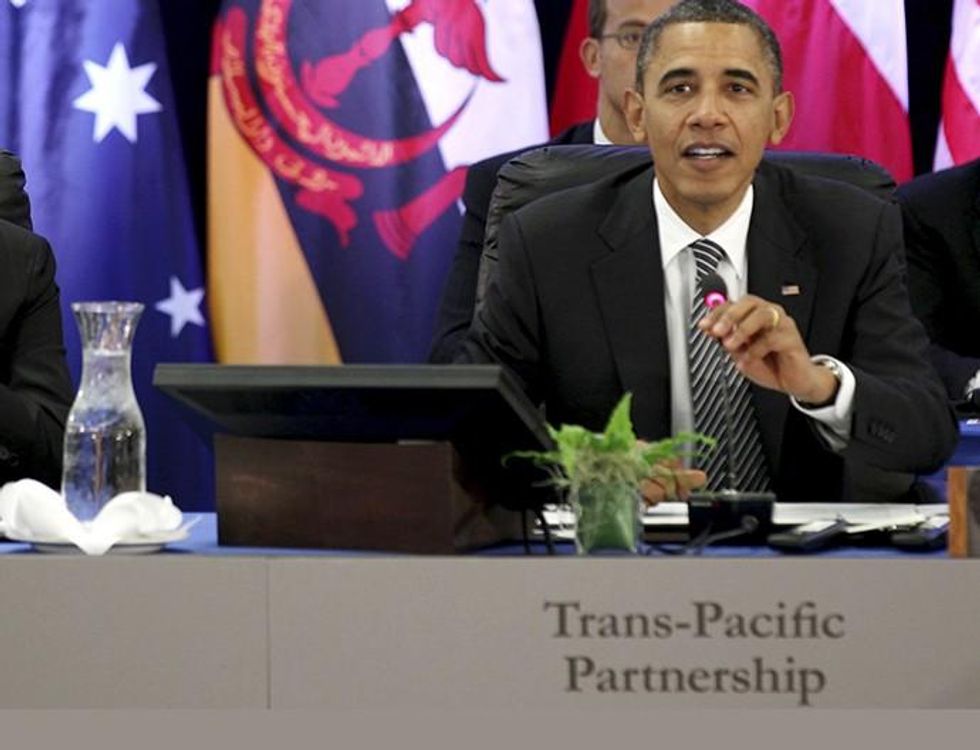The Obama administration's pro-corporate
Trans-Pacific Partnership (
TPP) agenda appears to have missed a deadline.
Ministers and delegates representing 12 nations announced Tuesday they have failed to meet the end-of-year goal of clinching the TPP trade deal after four days of negotiations in Singapore ended without an agreement.
The statement immediately follows a Wikileaks release, previously reported by Common Dreams, exposing near zero support for a drastic pro-corporate agenda pushed in the TPP by the Obama administration, including demands for NAFTA-style secret corporate tribunals, limits to bank regulation, and conditions that would increase the cost of life-saving medicines.
"At this meeting, the negotiators' political imperative to 'make a deal' -- any deal -- resulted in a raft of dangerous decisions that would severely threaten consumers' access to affordable medicines, undermine Internet freedom and empower corporations to attack our domestic laws," said Lori Wallach, Director of Public Citizen's Global Trade Watch. "[A]s more details emerge weekly about the damage TPP could do to workers, consumers and the environment, grassroots and lawmaker opposition in many countries is growing."
No new timeline has been drafted for what is poised to be the largest U.S. trade deal in history, establishing a "free trade" zone between Australia, the U.S., Canada, Japan, Mexico, Peru, Vietnam, Malaysia, Brunei, Chile, New Zealand, and Singapore--countries that comprise nearly 40 percent of the world's GDP.
Despite the breadth of this potential deal, the contents of its negotiations have been hidden from the public and U.S. lawmakers, with much of what is known publicly about them exposed by leaks.
"We identified potential landing zones for the majority of key outstanding issues in the text," stated U.S. Trade Representative Michael Froman, reading a joint statement from negotiators on Tuesday. "We intend to meet again next month," he said, indicating that market access issues remain unresolved.
Wikileaks released an internal memo (pdf) and spreadsheet (pdf) from an unidentified government official on Monday that reveal resistance to U.S. demands for inclusion of corporate giveaways, including conditions that would allow corporations to bypass national law and sue governments in secret courts--boosting their power to steamroll environmental, labor, and public health protections. This also includes a push for intellectual property conditions that would reduce access to more affordable generic medicines and reduce the power of governments to negotiate lower medicine prices. The U.S., in addition, is demanding a limit to the ability of governments to regulate banks in times of crisis, according to Zach Carter at the Huffington Post.
The leaked memo reads, "Inadequate progress. The positions are still paralyzed. United States shows zero flexibility," regarding financial services negotiations.
In a statement emailed to Common Dreams, Public Citizen warned, "However, many countries have caved to relentless U.S. demands that they alter their domestic patent and medicine pricing laws to meet the desires of large pharmaceutical firms."
This latest leak follows the November 13 Wikileaks exposure of the Obama administration's TPP push to erode internet freedoms and cut access to medicines in what analysts say are the most damaging and dangerous proposals in the history of U.S. "free trade" deals.



